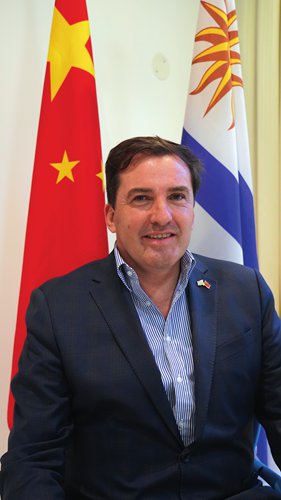IN-DEPTH / DIPLOMATIC CHANNEL
Strong expectation in future ties: Uruguayan ambassador

Even though China and Uruguay are very different and very far away, the two sides have a lot of symmetries and values in common, the Uruguayan Ambassador to China Fernando Lugris said. Photo: Yin Yeping/GT
A group of four Uruguayan students from an impoverished part of Montevideo, capital of Uruguay, were invited to visit China in August. It was their first trip ever to a foreign country.What made their trip special is that they are studying at a local primary school named "the People's Republic of China," which was made possible only by China's donations to the Uruguayan government, and which is being expanded with a new school campus.
The Uruguayan Ambassador to China Fernando Lugris welcomed these Uruguayan students at the Uruguayan Embassy in China. They were also met by a group of Chinese primary school students who were invited to join this friendly meeting.
"We would like to see that the center of our work is about people, as I truly believe that people-to-people connections are a foundational element that can make a difference in our bilateral relations," Lugris said in his welcoming speech at the event.
Since China and Uruguay established diplomatic relations in 1988, opportunities in trade, investment, tourism and culture have been growing. When Ambassador Lugris came to office, he saw a further increase in the needs for bilateral exchanges. As one of the drivers of the exchanges, he hosted different kinds of cultural activities together with his Chinese counterpart to narrow the knowledge gap between the two sides.
Today, in many Uruguayans' mind, China is no longer just about martial arts but also a high level of education and advanced technology. To many Chinese, Uruguay is not just a country with skilled soccer players but also a provider of good dairy products and quality beef.
On the occasion of the 70th anniversary of the founding of the People's Republic of China, Global Times reporter talked with the Uruguayan ambassador to China, who shared with us how he saw people-to-people connections between China and Uruguay as the foundation of the bilateral relations.
Closing the distance
At around 1,900 kilometers from China and over 30 hours away by plane, Uruguay, the South American pearl, is one of the farthest countries from China. But its geographical location has not hampered connections between the two peoples.
From 1988, when the two sides established diplomatic relations till now, the steady growth in trade and investment has been evidence of closer relations. The bilateral trade volume rose from $124 million in 1988 to $4.62 billion last year. China is Uruguay's largest trading partner and its largest importer of wool, beef, pulp and soybeans. Nowadays most of the beef Uruguay produces is exported to China. Lugris said that in Uruguay, there are three million people and 12 million cows, or four cows for every person. "This beef used to go to Europe, the US, Brazil and many other places in the world, but not much to China," he said. "Now 60 percent of our beef comes to China, making Uruguay the third largest provider of beef for China," Lugris said, pointing out that this has contributed greatly to the outstanding bilateral relationship and cooperation between the two countries.
These strong bilateral ties are not just reflected in trade. The Uruguayans understand the importance of building stronger connections with China.
As Lugris said, "Even though the two countries are very different and very far away, and even though Uruguay is a tiny country and China is a huge country, we have a lot of symmetries and values in common and we understand each other." The ambassador noted that as the main donor to Uruguay, China is supporting the country in the areas where they need the most support. "China is helping us to tackle the most difficult issue in any society, which is poverty eradication and alleviation," he said.
Like many Uruguayans, Lugris has understood the growing need for bilateral ties with China, which was one of the reasons why he took a Chinese language course at college. "Chinese elements are always around the Uruguay people. We all know about martial arts and love Chinese food," he said. He also noted that by studying Chinese language, he was able to get closer to Chinese culture.
Build up knowledge
After being appointed Uruguayan ambassador to China, he has been able to understand China from his first-hand experience. Furthermore, his diplomatic position allows him to build greater contacts between Chinese people and his fellow citizens. As Lugris has always believed, people-to-people connections naturally come first in his work, and education provides the opportunities for boosting those connections.
"Since I arrived in China and since the establishment of the strategic partnership between China and Uruguay, we have been working intensively to increase the numbers of scholarships, so there are more students from Uruguay to China and more Chinese studying in Uruguay," Lugris said.
Lugris believes that the work of education is absolutely essential and academic exchanges should not only be held at the school level, but at the research level as well.
In December 2017, two years after he was appointed ambassador, a Confucius Institute jointly built by the University of the Republic of Uruguay and China's Qingdao University was officially inaugurated in Montevideo. It is the first Confucius Institute in Uruguay.
In addition, in April 2018, the first Uruguay Research Center in China was established in Beijing, helping to build a new bridge for the two peoples to enhance mutual understanding. As an important contributor to bilateral connections, Lugris participated in the launch of both organizations.
The ambassador said that in Uruguay, there is a great deal of curiosity about China, and only when you have people getting along with and understanding each other can you make plans for a much brighter future.
Kids are the future
Among these people-to-people exchanges, kids are the focus. The visit of the Uruguayan students to China in August is a good example of this philosophy.
The children visiting China come from one of the most difficult neighborhoods in Montevideo. Lugris said that it is a neighborhood the Uruguayan government needs to work very hard on. Only education can bring about a brighter future for the people in the region, he added.
Currently, there are over 300 students studying in the school of "the People's Republic of China" and a new school will be established soon.
"Through the cooperation with China, we are going to make a miracle happen in the coming month and it is going to be a present from the Chinese people," Lugris said. "It's very meaningful to send the young 'ambassadors' from these poor neighborhoods to thank China for being the number one donator to Uruguay, for understanding our needs, and for being open for collaboration with the areas that are most in need."
Uruguay is a country respected for its soccer history. It organized the first FIFA World Cup in 1930 and has won the World Cup twice. This is also where education exchanges in sports is finding its roots. "We are very interested in sharing what we think is our national treasure, which is the way we train kids. We think we are great in producing new stars from a very early stage," Lugris said. Correspondingly, the Uruguayan government is sending invitations to kids from China to come to Uruguay.
In Lugris's eyes, China and Uruguay are very complementary since Uruguay can be very strong in soccer and China is much stronger in almost all Olympic sports. "So we are very thankful that China is also helping Uruguayan professional sports people come to China and be trained in China," he said.
This cooperation of giving sports training to new generations between the two sides brings about new impetus to bilateral ties, and Lugris has great plans for making this cooperation even closer. "We hope that we can improve a lot in the coming years and we think that we need to focus on kids, because they are truly the future of our friendship," Lugris said.


